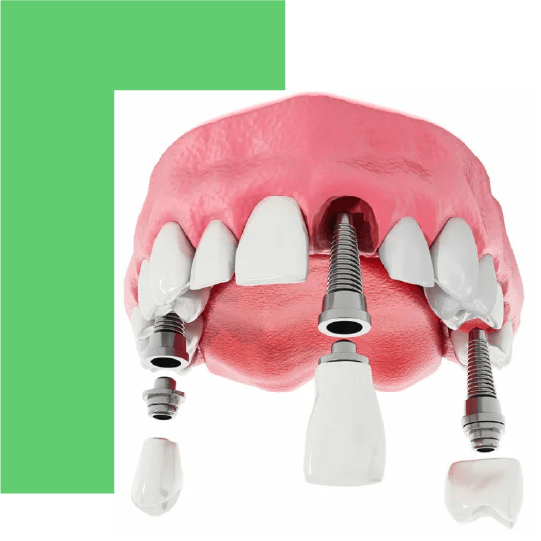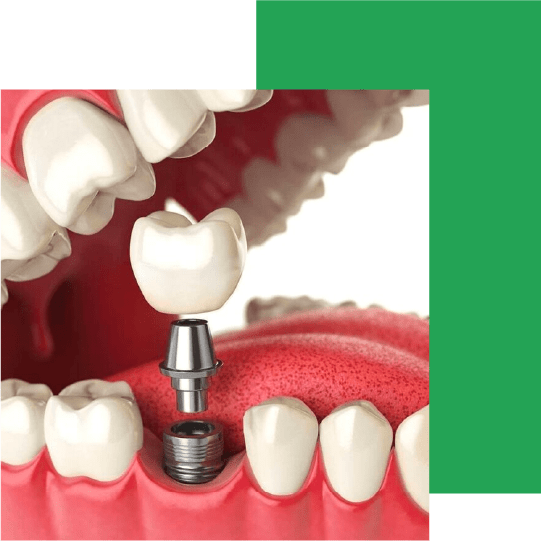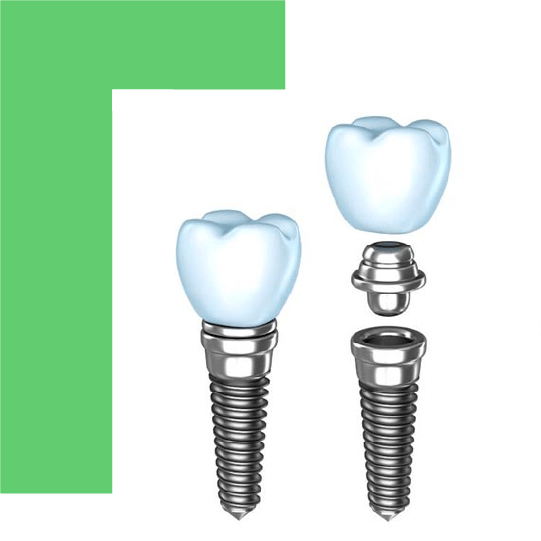DENTAL IMPLANTS
Implant-supported dentures have many functional, cosmetic, and health benefits.

What Are Implants?
Implants are artificial tooth roots made with high precision, made of biocompatible, highly pure titanium. It has a particularly good texture; bio-compatibility, combined with the bones, forms a secure connection, the so-called Osseointegration. Allergic reactions to titanium are not known. This tooth root is an integral pillar for the “three”. With it, crowns, bridges, or dentures can be attached.
For whom implants useful?
Implants are a good alternative for periodontal disease, periodontitis, tooth decay, or tooth loss due to accidents. An age limit does not exist here. Tooth loss affects more and more young patients and predominantly the elderly.
We distinguish between:
Single phase implants:
During the healing period, the implant planted above the mucosa remains visible. After this phase, the restorations can be cemented or screwed onto the crown structure of the implant.
Two-phase implant:
This implant is invisible and is covered during the healing of the oral mucosa. It must be exposed again, only after this phase is complete, under a local anesthetic.
How is an implant constructed?
There is generally a screw or cylindrical system. They are available in different lengths and diameters. The dental implant is implanted exactly where the prior tooth has fallen out and grows together with the bone.
• The gum is opened to provide enough space for the incision of the implant with a surgical scalpel or punch. The jaw bone is then treated with special drills under sufficient cooling with sterile saline, relative to the implant’s position and size. In between, you can do an x-ray inspection to check the selected position (direction, depth of the hole, etc.).
• Then the implant is firmly fixed into the bone. Many implant systems provide a screw thread using which the implant is screwed into the drill hole using a ratchet. Cylinder implant systems are hammered into the jaw bone.
• After the implant has been set, a so-called healing cap is screwed onto the artificial tooth root, and the mucous membrane is sewed (closed method), or small support is applied, which serves to shape the gums directly (open method).
• In individual cases, the implant can also be supported immediately by temporary dentures.
• The implantologist must decide individually which type, length, and diameter are suitable for the patient. He must pay attention to the safety and durability of the manufacturer.
How long do implants last?
To ensure the preservation of the implant, regular control and great oral hygiene is paramount. Here, the function and the correct position of the denture must be checked. After years of studies, it was discovered that a very high success rate is predicted for toothless jaws, and it was shown that implants can last a lifetime.
Many causes can result in the loss of the implant, e.g., heavy smoking, poor oral hygiene, persistent bleeding of the gums, and inflammation of the bone tissue. Sometimes it may happen in rare cases that the artificial tooth root does not connect with the bone.


What advantages do implants have?
Implant-supported dentures have many functional, cosmetic, and health benefits. This creates the feeling of a natural smile; it can no longer slip or fall out, and the patients feel as though they can chew and speak with their teeth again.
What health benefits do they have?
An implant only replaces the missing gaps, and it has a significant advantage that one does not have to grind the healthy adjacent teeth. Implants can provide a lot of strength for the surrounding bones, preserving the bone and supporting tissue. Bone loss can be delayed, and therefore implants should be planted as soon as is possible after the extraction of a tooth.
What you should know:
• For implants, a surgical procedure is required
• With an eventual opening of the maxillary sinus
• The procedure can be costly
• Requires more oral hygiene
• Long duration of treatment






